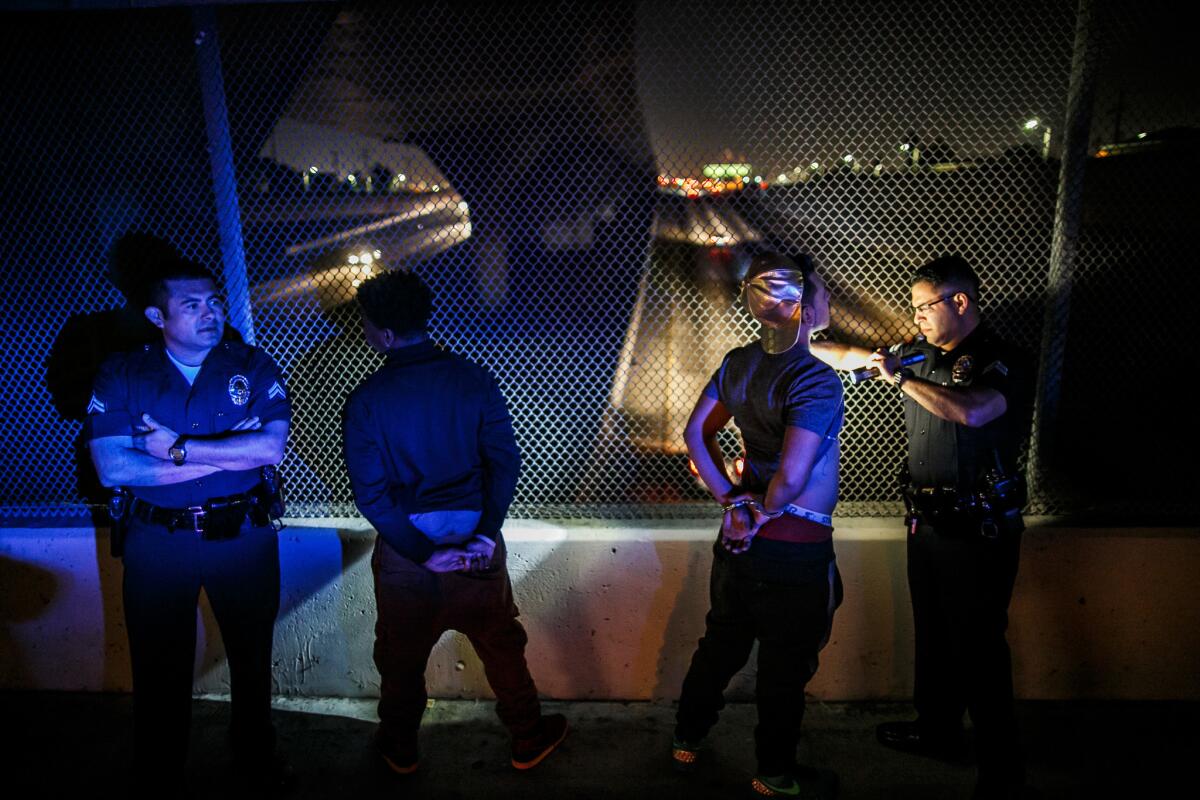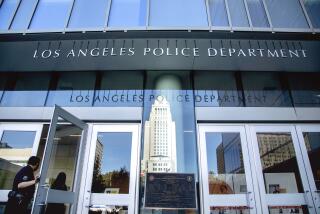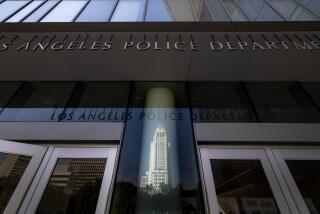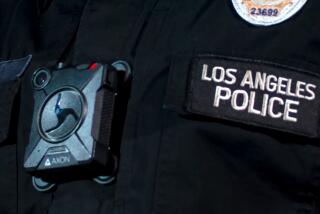Division scrutinized for allegedly falsifying interview cards issued the most in LAPD

The Los Angeles Police Department division under scrutiny for officers who allegedly falsified field interview cards that portrayed people as gang members has played an outsized role in the production of those cards, a Times analysis found.
The field interview cards have been used for decades to gather intelligence and create a database that officers can access to help with investigations. Police can fill them out to document encounters they have with anyone they question on their beat. Information from the cards is also used to add names to the statewide CalGang database.
The elite Metropolitan Division made up about 4% of the force but accounted for more than 20% of the department’s field interview cards issued during a recent 18-month period, the analysis shows. The division completed 44,000 cards from July 1, 2018, through the end of last year.
Metro Division officers completed the cards in 65% of their stops, more than three times the rate of officers in the 77th Street, Southeast and Southwest divisions, which have more crime than other parts of the city, records show.
And more than half of the people stopped by Metro officers who had field interview cards completed about them were not arrested or cited — a rate five times higher than the rest of the department, according to the review of LAPD stop data.
The data reviewed by The Times does not indicate if an officer documented a person as a gang member on the field interview card itself. The LAPD has refused to disclose that information under the state open records law, saying that releasing details from the field interviews could compromise ongoing investigations.
LAPD officials said the figures reflect the division’s mission as a mobile reserve unit that focuses on proactive enforcement to curb violent crime instead of handling everyday radio calls.
“There’s nothing that precludes an officer from completing an FI card on everyone they come in contact with,” LAPD Assistant Chief Horace Frank said. “Some patrol officers do it. Some patrol officers don’t. But I don’t think we can fault them for doing what they’re expected to do, which is completing the FI cards.”
But policing experts and civil rights advocates raised concerns about whether the department’s data-driven culture motivates officers to fill out more cards and if people added to the field interview database could fall under unwarranted scrutiny.
Peter Bibring, an attorney at the ACLU of Southern California, said the much higher number of field interview cards submitted by Metro officers highlights the problematic nature of the division’s use of pretextual traffic stops to suppress crime, in which officers use a minor violation such as a broken taillight to stop a vehicle and look for more serious wrongdoing. In October, LAPD Chief Michel Moore directed Metro to scale back on such proactive patrols.
Bibring said that even if they are not involved in criminal activity, individuals documented on Metro officers’ field interview cards may still be more likely to be considered a suspect in an investigation.
“If their FI cards are in the system, even if the information on them is vague and there’s no clear evidence of criminal activity, there can be a sense that where there’s smoke, there’s fire,” Bibring said.
In the current Metro scandal, similar concerns have been raised about those who are added to the CalGang database. Eighteen people are currently under scrutiny in a probe of officers who falsified information used to enter people into the database.
The gang-framing allegations came to light after a Van Nuys mother received a letter early last year from the LAPD saying her son was identified as a gang member during an interview with officers in late 2018. She believed her son was misidentified and reported it to a supervisor at a nearby police station. Officials then reviewed body camera footage and other information and found inaccuracies they attributed to an officer.
California Atty. Gen. Xavier Becerra, who in February announced an investigation into the LAPD’s use of the database, said that being erroneously placed in the database can lead to unwarranted scrutiny by law enforcement. Bibring said the same thing could be true of an individual for whom a field interview card is completed.
“The concern with law enforcement databases is they provide a starting universe for police to conduct an investigation,” he said. “If an officer is looking for suspects and a crime is committed in a particular area, they may not know every person that lives in that the area, but they can call up all the FI cards.”
Frank called Bibring’s assertion that being in the field interview database alone could subject an individual to unwarranted scrutiny “absolutely false.” Officers use the database to look for particular people, he said, not to cast a wide net for suspects. He also noted that not all cards are entered into the department’s database.
The productivity of Metro officers is measured in part by the number of gun seizures, citations and field interviews they conducted, an internal document obtained by The Times showed. Frank said that patrol divisions also track the number of field interview cards that officers complete.
An LAPD source who is not authorized to discuss the investigation and requested anonymity said Metro officers feel pressure to produce statistics in a results-driven department. The problems stem from a Metro expansion in 2015 to target guns and gangs, the source said. Department officials have said there are no quotas that would incentivize officers to complete more field interview cards.
“We have to have some way of measuring officers’ performance, and this is how we track it,” Frank said. “But it doesn’t allow an officer the ability to lie, or cheat or provide false documentation.”
Policing experts said the department’s tracking of field interview cards should not be downplayed, especially considering that Metro officers filled out cards on more than half of those they stopped when there was no arrest made or citation issued.
“Completing field interviews is clearly a performance metric for these officers and supervisors are usually held accountable for the performance of their officers,” said Richard Rosenfeld, criminology professor emeritus at the University of Missouri St. Louis.
Rosenfeld said that he accepted the LAPD’s explanation for Metro’s high field interview card rate, but that the same explanation should apply to other specialized units that do not focus on responding to everyday radio calls. While officers who focus on gang enforcement completed field interview cards in 28% of stops, Metro’s rate was still more than twice as high as theirs.
Frank said that the lower rate of gang enforcement officers filling out cards stems partly from the fact that they are often in court and spend less time in the field.
The stop data offers a window into how different divisions use field interview cards as a technique for intelligence gathering.
Of the 50 LAPD officers who completed the most cards, more than half were from Metro, the analysis found. Four of the five most prolific individual LAPD officers were assigned to Metro and filled out cards on roughly 90% of the people they stopped.
Frank said he was not surprised that some Metro officers would be more meticulous about filing cards than others in the department.
“It doesn’t indicate any wrongdoing,” he said. “Here’s where my concern would be: If they were completing FIs on individuals that they never came in contact with. And in fact, that’s one of the things that we’re looking into as part of this whole [gang] investigation.”
Overall, Metro officers completed cards for 67% of Latinos they stopped, 64% of blacks and 57% of whites. Frank said every stop conducted by officers is based on probable cause, and that raw numbers by themselves are not sufficient to cause concern about the racial differences.
“They’re not looking to stop an individual based on, ‘well is that person white or is that person black,’” he said. “They’re focused on addressing crime issues.”
To combat a surge in violent crime, the LAPD had doubled the size of the Metropolitan Division in 2015, creating special units to swarm crime hot spots. But last October, Moore said he was revamping the division and that Metro crime suppression officers would focus on tracking down suspects wanted for violent crime and use strategies other than vehicle stops.
The move came after a Times investigation found that Metro officers stopped African American drivers at a rate more than five times their share of the city’s population.
Metro’s field interview card rate had been climbing steadily to more than 70% through last fall. After Moore’s announcement, the rate at which Metro officers completed cards dropped to less than 40%.
More to Read
Start your day right
Sign up for Essential California for news, features and recommendations from the L.A. Times and beyond in your inbox six days a week.
You may occasionally receive promotional content from the Los Angeles Times.








